|
|
|
Sort Order |
|
|
|
Items / Page
|
|
|
|
|
|
|
| Srl | Item |
| 1 |
ID:
142062
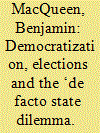

|
|
|
|
|
| Summary/Abstract |
De facto states are an anomalous, but well-discussed feature of international politics. The questions they raise for understandings of sovereignty and statehood are well advanced, but less understood are the internal dynamics of these entities particularly in relation to the development of democratic, participatory political institutions. Through an examination of the Kurdish Regional Government in Iraq from 1992 to 2014 this article will explore patterns of democratization in de facto states. Unpacking a dilemma around trends toward both exclusionary and inclusionary politics in de facto states, it is argued here that there is a positive relationship between de facto statehood and democratization. However, contrary to current views, this is the result of internal pressures and elite agency as opposed to normative pressures at the international level.
|
|
|
|
|
|
|
|
|
|
|
|
|
|
|
|
| 2 |
ID:
142066
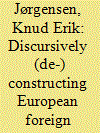

|
|
|
|
|
| Summary/Abstract |
This article is about European foreign policy, specifically an examination of ways in which discourse analysis and foreign policy analysis can be brought together. The first aim of this article is to explicate the explanandum in some detail. Before we know what we are looking for, it gives limited meaning to consider procedures for methodological procedures. Once the explanandum has been identified, the article examines theoretical approaches and critically discusses their promises and limitations. Priority is given to the option of applying constructivist discursive theories that might (or might not) have been developed with a view to analysing foreign policy, including European foreign policy. In doing so, the article aims at bridging several sometimes very different fields of study: discourse theory, which is sometimes utterly unaware of or uninterested in foreign affairs; and foreign policy analysis, which is frequently descriptive in orientation and at times characterized by less-than-benign neglect of discourse theory.
|
|
|
|
|
|
|
|
|
|
|
|
|
|
|
|
| 3 |
ID:
142068
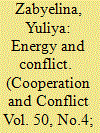

|
|
|
|
|
| Summary/Abstract |
Attacks on oil and gas infrastructures by terrorists and criminals in places like Nigeria, Colombia, Iraq and Russia have amplified the vulnerability of critical energy infrastructures (CEIs) to deliberate physical attacks. Being unable or unwilling to protect CEIs, many national governments have made attempts to alleviate these vulnerabilities through outsourcing of security, i.e. contracting the responsibility to protect CEIs out to non-state actors. This article advocates the need to conceptualize security outsourcing in the domain of critical energy infrastructure protection (CEIP) in order to explain a variety of regulatory choices made by governments in this domain. Based on a qualitative analysis of four case studies, the article discusses various types of security outsourcing in the protection of CEIs, including the militarization of national oil companies, public–private partnerships and the involvement of international organizations and local social groups. The typology may serve as a tool of describing, classifying and evaluating various forms of security outsourcing. The findings of the article help to deconstruct the complexity of security outsourcing and capture some of the major contemporary trends in energy security.
|
|
|
|
|
|
|
|
|
|
|
|
|
|
|
|
| 4 |
ID:
142064
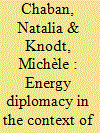

|
|
|
|
|
| Summary/Abstract |
This paper examines a supranational actor, the European Union (EU), as a producer of energy diplomacy. This study uses a comparative analytical framework of state-centred vs. multistakeholder diplomacies to explore EU energy diplomacy towards the ‘emerging’ powers of Brazil, India, China and South Africa (BICS). It also elaborates the multistakeholder model by advocating the inclusion of a new element – a consumer of diplomatic actions – into its conceptualization. In this way the paper suggests a new synthesis of the concepts of multistakeholder and public diplomacies. Advancing the notion of energy diplomacy, our analysis suggests that this type of diplomacy goes beyond state actors as producers of diplomatic outcomes, and is no longer confined to the norms of security of supply and competitiveness; EU energy diplomacy is a complex blend of multistakeholder and state-centred diplomacies, participants (producers and consumers) and communication modes. This comprehensive approach to diplomacy – led in the EU’s case by norms of sustainability, competitiveness and security of supply – is a response to the challenges of global governance, multipolarity and multinational cross-sectoral networks.
|
|
|
|
|
|
|
|
|
|
|
|
|
|
|
|
| 5 |
ID:
142065


|
|
|
|
|
| Summary/Abstract |
Risk scholars within Security Studies have argued that the concept of security has gone through a fundamental transformation away from a threat-based conceptualisation of defence, urgency and exceptionality to one of preparedness, precautions and prevention of future risks, some of which are calculable, others of which are not. This article explores whether and how the concept of security is changing due to this ‘rise of risk’, through a hermeneutically grounded conceptual and discourse analysis of the United Kingdom government’s National Security Strategy (NSS) from 1998 to 2011. We ask how risk-security language is employed in the NSS; what factors motivate such discursive shifts; and what, if any, consequences of these shifts can be discerned in UK national security practices. Our aim is twofold: to better understand shifts in the security understandings and policies of UK authorities; and to contribute to the conceptual debate on the significance of the rise of risk as a component of the concept of security.
|
|
|
|
|
|
|
|
|
|
|
|
|
|
|
|
| 6 |
ID:
142063
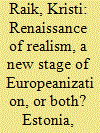

|
|
|
|
|
| Summary/Abstract |
The relationship between EU foreign policy and national foreign policies of the member states is changing due to various factors: the entry into force of the Lisbon Treaty in 2009 and subsequent creation of the European External Action Service (EEAS); the economic crisis in Europe; and shifts in the global balance of power. The article explores these new dynamics in light of two cases, Estonia and Finland. It examines why the two countries support further integration in the area of foreign policy and what determines the limits of their support, applying rationalist and constructivist approaches. From a rationalist perspective, Finland and Estonia view the EU and the EEAS as a means to pursue national interests and make diplomacy more cost-effective; these aspects have become more important due to the economic crisis and changes in the international context. At the same time both countries value the EU as a security community and a source of solidarity, which points to the importance of socialization, as conceptualized by constructivists. However, the predominance of national foreign policy identity and an instrumental approach to the EU leaves limited space for deeper socialization, in spite of the new mechanisms of socialization introduced by the EEAS.
|
|
|
|
|
|
|
|
|
|
|
|
|
|
|
|
| 7 |
ID:
142067
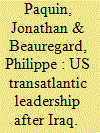

|
|
|
|
|
| Summary/Abstract |
This article explores whether the United States has been able to exert transatlantic leadership since its head-on diplomatic collision with several European capitals over the 2003 Iraq war. Considering that the decision to invade Iraq was made by the Bush administration, this article also explores whether there has been consistency between the Bush and Obama administrations over transatlantic leadership. To answer these questions, this article reports on a computer-assisted content analysis of the 415 official statements issued by the core transatlantic allies, namely the United States, France, and Britain, in response to four major crises that have occurred in the Middle East and North Africa in the post-Iraq era. This analysis provides qualitative and quantitative evidence leading to four main conclusions. Firstly, US leadership has endured in the post-Iraq era. Secondly, in most cases, France and Britain have aligned their diplomatic positions with those of the United States. Thirdly, the analysis confirms that there is a special Anglo-American relationship. Fourthly and lastly, there has been consistency between the Bush and Obama administrations, with the exception of the US response to the Libyan crisis, which suggests the emergence of a US ‘leading from behind’ transatlantic strategy.
|
|
|
|
|
|
|
|
|
|
|
|
|
|
|
|
|
|
|
|
|